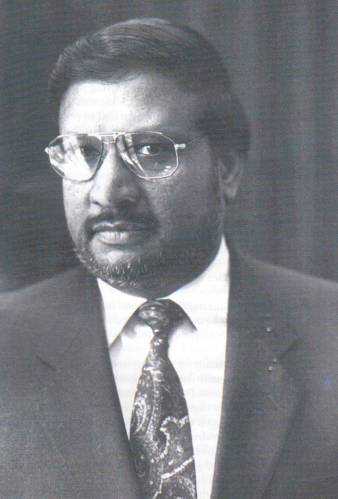
Sri Lanka’s ongoing corporate war, perhaps the most controversial and acrimonious todate pitting two of the country’s leading Investment Banks, Asia Capital Limited(ACL) and Vanik Incorporation, has grabbed the attention of both the media and the business community alike in Sri Lanka. Interestingly, both Vanik and Asia Capial are keen to play down any suggestions of a corporate war. However, with so much sabre rattling and muscle flexing going on, these two entities are hardly at peace with each other.
The whole issue flared into open conflict following Vanik’s proposed bid to acquire two unlisted subsidiaries of Forbes and Walkers Securities Limited (FWSL). This set off a chain of events culminating in Asia Capital’s unprecedented offer to buy Vanik. According to market analysts, the takeover of Forbes Ceylon, a cash-rich company would enable a somewhat cash-strapped Vanik to finance its expansion activities.
Vanik has grown rapidly over the years. Its management is aggressive and innovative. However, the main problem facing Vanik according to analysts is its lack of funds. Its balance sheet seems to indicate a tightening liquidity.
On the otherhand, ACL is a more conservative company and cash-rich, so much so one analyst quipped, “they don’t know what to do with it”. ACL has styled itself purely on the lines of an investment banker concentrating on Corporate Banking unlike most Sri Lankan merchant banks who have diversified into leasing.

A letter written to Surekha Sellahewa (Manager, Surveillance and Enforcement, Colombo Stock Exchange) by Vanik’s President and Chief Executive officer, Justin Meegoda on October 31, states categorically that there is no proposed merger between Vanik and Forbes Ceylon Limited (FCL). The letter goes on to state that Vanik is having discussions with Global Equity Corporation with regard to the sale of two unlisted subsidiaries of Forbes Securities Ltd (FSL). Global Equity owns FSL.
However, on November 1, Vanik sent a letter addressed to Aritha Wickramanayake, Director General of the Securities and Exchange Commission of Sri Lanka (SEC) stating that Vanik “proposes to acquire from Forbes and Walker Securities Limited both its 100% interest in Forbes and Walker Limited, a Private Company in Sri Lanka and its 100% interest in Forbes and Walker International Limited, a Private Barbadian Corporation”, which would indirectly give Vanik 50.99% of the Capital of Forbes. Ceylon Limited.
The rest is history. On November 11, ACL made an offer to acquire all the issued shares of Vanik on the basis of one Vanik share for one new ACL share plus Rs 10. The conditions of the offer were as follows:-
Asia Capital Vs Vanik
by AR Abdul Hafeel
1.Valid acceptances being received prior to the final closing date in respect of not less than 90 percent (or such lesser amount as Asia Capital may decide of the Vanik shares, provided that this condition will not be satisfied unless Asia Capital shall have acquired or agreed to acquire (pursuant to the offer or otherwise) shares in Vanik carrying more than 50 per cent of the voting rights exercisable at a general meeting of Vanik.
2. The passing at an extraordinary General Meeting of Asia Capital of the necessary resolution to approve the offer, to increase the authorised share capital of Asia Capital and to confer the necessary authority for the allotment of new Asia Capital shares pursuant to the offer and
3. The Sri Lankan regulatory authorities granting listing of and permission to deal in the relevant new Asia Capital shares.
Vanik treated this offer as “unsolicited, unwelcome and a hostile bid”. According to financial analysts specialising in the banking and finance sector, ACL, after the last initial public offering (IPO) is still cash-rich with a considerable investment in treasury bills. However, Vanik Incorporation was relatively not too successful in raising its capital requirements. The recent debenture issue by Vanik which was only 25% subcribed is also likely to tighten liquidity. Vanik also had to reduce lending because of increasing money market rates. This is common to most merchant banks in Sri Lanka who borrow from the money market to finance their capital requirements.
The financial community in general has welcomed mergers and takeovers as a welcome move. Broadly, companies have two ways to expand, one way is through organic growth i.e., by developing its own business over a period of time. The other is through mergers and acquisitions, which is a faster but a more expensive method of growing.
According to Dr Anush Amarasinghe, Head of Research, Soc-Gen Crosby Sri Lanka, mergers and acquisitions were quite common in rapidly developing countries such as Malaysia and Indonesia and are infact encouraged by the government.
Moreover, senior banking and financial sector analysts expressed concern over ACL’s ability to manage the fund side of Vanik’s operation e.g., leasing, as ACL being a corporate bank has more experience only on the fee side.
Meanwhile, a spokesman for the National Asset Management (Pvt) Ltd. (NAMAL), said that as unit trust managers they would remain impartial on the issue of any proposed takeover and will ensure that the unit holders get the best value for their investments. He added, that in a situation like above they would seek the right value for their shareholdings.
According to Dheerendra Abeyratne, Fund manager, Unit Trust Management Co. (Pvt) Ltd., hostile takeovers is welcome news to the minority shareholders. Generally in most Sri Lankan Companies, the minority shareholders are neglected and not even paid dividends, leaving the much maligned minority shareholders to fend for themselves. As unit trust managers seek small investments in many companies mainly to reduce risk, they too fall under this category of minority shareholders. According to Abeyratne, such hostile takeovers will force the majority shareholders and the management to take notice of the minority. Hence the practice of companies merely seeking funds from shareholders and not offering them returns would end.
There are persistant doubts within the financial community about the true intentions of ACL and how serious it is about its proposed bid to takeover Vanik. There are many who believe that this is merely a ploy to prevent Vanik from acquiring FCL. Many analysts argue that Rs 10 plus the price of a diluted ACL share would be less than the price of a Vanik share, casting doubts on ACL’s offer.
How serious is ACL about taking over Vanik? In an interview with Business Today, Ian Hardy, Chief Executive Officer of ACL, said that ACL is “very serious of taking over Vanik”. According to him, Vanik could overcome its current capital shortage by merging with ACL. Hardy said that Vanik’s current capital shortage was highlighted indirectly by its proposal to purchase the two subsidiaries of Global Equity Corporation and the recent debenture issue.
ACL already has a 11% stake in FCL. Hardy said that ACL is interested in maximising its shareholding in FCL, and added that ACL had never made any proposal to the Global Equity Corporation and has had only correspondence with them. When asked about his view of the FCL reputation as a cash-rich company, ACL’s CEO said that the best assessment could only be undertaken by its controlling shareholder. FCL is reported to have Rs 6.50 per share or even more in the form of cash along with other assets.
According to Hardy, the proposal made by Prudentia Investments to return FCL’s idle capital to the shareholders was reasonable. However, he said that he found it difficult to accept Vanik’s offer, since in most likelihood Vanik would use FCL’s cash resources to fund its indirect acquisition of FCL, and added that any proposal must be of benefit to the FCL shareholders.
Asked in what way the shareholders of Vanik would benefit from the ACL offer, Hardy termed the ACL offer as “attractive”. According to him the merger of Vanik and ACL would create a very powerful entity, combining the leasing expertise of Vanik with the securities and other corporate banking functions of ACL. He added that ACL has not conducted any negotiations with Vanik shareholders.
According to Hardy the basis used by ACL to value Vanik was broadly based on its asset value. He added that the current offer by ACL still stands, adding that it was the maximum price ACL was willing to pay to takeover Vanik.
Asked whether ACL was capable of sustaining financially the takeover of Vanik, Hardy answered in the affirmative, adding that ACL had Rs 600 million in cash, Rs 300 to 350 million in listed equity investments and Rs150 million in the form of unlisted investments. The ACL CEO flatly rejected any suggestions of corporate war between ACL and Vanik. He added that it would be very disappointing if this matter had to go to court.
Meanwhile in an interview with Business Today, Justin Meegoda President and Chief Executive Officer of Vanik said that Vanik has not concluded any agreements with Global Equity Corporation for the purchase of its 50% shareholding in Forbes Ceylon Limited. According to Meegoda, the Ondaatge Corporation (OC), formerly the major shareholder in FCL, had ap proached Vanik during the latter part of 1994 and had conducted negotiations with Vanik with regard to the sale of FCL. A team from the OC was specifically sent from Canada to conduct the negotiations. However, according to Meegoda, the negotiations had broken down because the two parties could not agree on a price. Later, the OC was sold to a U.S. company based in San Diego, California, who renamed it “Global Equity Corporation.”
According to Meegoda, the Americans were not very keen on their Sri Lankan operations and had wanted to sell FCL to a local investor. It is learnt that ACL had approached Global Equity Corporation a few months ago and had conducted negotiations with regard to the purchase of FCL. Apparently the negotiations had broken down.
Meegoda said that Vanik had received some signals from Global Equity Corporation through informal channels, with regard to the sale of FCL. According to Meegoda, Vanik has expressed interest in FCL not merely because it is a cash-rich company but also due to the Central Bank authorisation permitting FCL to invest 40% of its equity overseas. Thus the purchase of FCL would be strategic for Vanik as it would enable it to invest in the overseas market, the Vanik Chief added. The acquisition of FCL would go hand-in-hand with the Vanik strategy of diverisifaction, especially in the South Asian region.
The Vanik CEO charged that ACL had ulterior motives in offering to takeover i.e., to scuttle the ongoing negotiations between Vanik and Global Equity Corporation. He added that on behalf of the majority of the promoter shareholders who hold around 35% of Vanik’s issued share capital, he would reject even an amended offer from ACL. He added that they had given him written assurances that they would not vote for an amendment of the articles of association of Vanik, which currently restricts any single local investor from holding more than 10% of the issued shares.
Asked whether Vanik was in a financially viable position to sustain a takeover of FCL, Meegoda replied in the affirmative. He added that Vanik’s liquidity position was very positive.

According to Meegoda it was a “deliberate policy” of Vanik to make use of the short term financial instruments in the money market to meet its borrowing requirements. However, he stressed that Vanik has followed a prudent financial policy and had not exceeded any of the financial guidelines set out by the board. He added that Vanik’s short term borrowings were backed by credit lines extended by other banks, reflecting his company’s credit worthiness. Meegoda rejected suggestions that the recent debenture issued in the beginning of this year was to finance Vanik’s capital requirements, adding that it was planned well in advance. He said another debenture issue during the first quarter of 1997 was on the cards. depending on the market conditions.
Meegoda went on to state that Vanik has Rs 1 billion in equity with borrowings totalling Rs 2.5 billion, translating into a gearing ratio of 2.5:1 which is well below Vanik’s own financial guidelines that provide for a gearing ratio of 6:1.
He added Vanik would structure a financial agreement to purchase the controlling interest in FCL. However, he declined to comment on the nature of the financial agreement or the instruments to be used in the deal, for obvious reasons.
In a display of sabre rattling Meegoda challenged ACL to raise atleast Rs 2.5 billion in loans from the Sri Lankan market, a feat already achieved by Vanik. Meegoda said that a company by being merely cash-rich proved nothing and that idle funds should be utilised for the growth of the company.
Asked whether Vanik was on a war path with ACL, Meegoda replied in the negative adding that he treated ACL as a “competitor” and not as an “enemy”. He went on to add that in a free market, competition is essential. However, he warned that any unwarranted action by a competitor would be dealt with appropriately.
The legal issues behind this corporate war are the sticky and murky areas. There are many in the business and legal circles who feel that this issue would ultimately be settled in court. However, both sides are eager to brush aside any suggestions of resorting to judicial action.
Perhaps one of the most hotly debated areas is the articles of association of Vanik. Much of the debate surrounds Rule 38 of the Vanik articles, which states that no transfer of shares shall be registered if the registration would result in the transferee acquiring directly or indirectly a shareholding which shall exceed 10% of the issued share capital of the company. However, this Rule 38 is not applicable to international financial institutions. Vanik’s CEO justified this on the grounds that banks unlike other companies should not be under the control of any single party, adding that when Vanik was formed it was a company policy that the management should be professionals, independent from the dictates of the majority shareholders. However, in the case of international financial institutions such as the ADB and CDC (UK), Meegoda said that while bringing in equity, such institutions were not interested in dominating the management. Section 36 of the Vanik articles states:
“Notwithstanding anything to the contrary in these presents if and so long as the Company’s shares are quoted in any licensed Stock Exchange, the Board may register without incurring any liability therefore any transfer of shares in accordance with the requirement of the Rules and Regulation in force for the time being and from time to time of such licensed Stock Exchange and agency whose primary objective is to act as Central Depository for such Exchange.”
This is however a standard clause required for any company listed in the Colombo Stock Exchange (CSE).
ACL charges that such restrictive clauses as Section 38 of Vanik are prohibited by the rules and regulations of the CSE. Section 5 of the rules and regulations of the CSE broadly states that fully paid up shares shall be free from any restriction on the right of transfer. The key issue here is the interpretation of the words “register” and “transfer”. ACL says that there is no significant difference between the two, the SEC and Vanik say there is.
The other legal issue is the much talked of and little understood Takeovers and Mergers Code 1995. Almost everyone in the business community candidly admit that this new code is a grey area to them.
The code defines a takeover as “a transaction or series of transactions whereby an individual or a company aquires control over the assets of a company either directly by becoming the owner of those assets or indirectly by obtaining control of the management of the company.”
The Takeovers and Mergers Code 1995, was tested only once involv ing a public company i.e., the Lankem Kottagala takeover, where Lankem acquired control of George Steuart’s who had majority control over the Kottagala plantations, a listed public company. The SEC had viewed this as a takeover. However, the Attorney General had ruled to the contrary.
According to legal analysts, the Attorney General’s view in the Vanik – FCL case would probably differ from his view in the former case, in that Lankem did not own any shares in Kottagala while Vanik currently holds 0.99% of FCL.
Ian Hardy described Vanik’s request to the SEC to confirm that its acquisition of FCL would not come under the purview of Rule 31 of the Takeovers and Mergers Code, as “totally erroneous”. Rule 31 broadly states that if any person acquires through a series of transactions, shares, which together with those held by persons acting in concert with him have 30-50% of the voting rights of the company, and if such persons acquire additional shares carrying more than 2% of the voting rights, they must extend within 35 days an offer to the existing equity shareholders. ACL has written to the Attorney General stating that the Takeovers and Mergers Code must also apply to the above proposed transaction of Vanik to acquire FCL.
At the time of writing, speculation is rife that Vanik is planning to acquire a 51% stake in Global Equity Corporation so as to circumvent Rule 31 of the code. The SEC says that such a move too is a takeover. Meegoda is reported to be out of the Island and was unavilable for comment.
The interpretation of these matters is best left to the courts. What is however sure is that, in the long run, the business community in general would benefit immensely if the courts can interpret the new Takeovers and Mergers Code. Such a move will also enable the Code to be developed further and make it less ambiguous.
As things stand now, ACL has filed an injunction against Vanik from acquiring FCL without the approval of Vanik’s shareholders. The hearing on the above injunction is scheduled for January 13. There are those who expect this corporate tussle to end in a legal battle and there are others who expect this entire matter to fizzle out with both parties seeking an accommodation. At this stage, however, the two scenarios are evenly poised. Whatever the outcome, this whole issue is bound to remain a pet topic of discussion in the corporate boardrooms and outside in the days to come.



